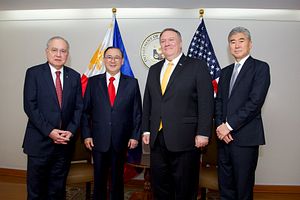Last week, the United States and the Philippines formally inked an agreement to advance cooperation to establish a new counterterrorism training facility. The agreement spotlighted one component of the broader U.S. approach to addressing terrorism and violent extremism in the Philippines and in Southeast Asia more generally.
As I have observed previously, the United States and the Philippines, which are formal treaty allies, share a defense relationship that runs across several areas, including counterterrorism. That aspect of collaboration has continued to be a key focus in recent years, with the confluence of U.S. worries on the threat as well as developments in the Philippines including the 2017 siege by Islamic State-linked militants in Marawi city.
That has continued on over the past year or so as well. The United States and the Philippines have been working on several aspects of counterterrorism cooperation including boosting training and equipment for Philippine law enforcement agencies, organizing courses covering areas such as investigations and prosecution, and programs designed to address the root causes of terrorism and violent extremism.
Last week, this aspect of U.S.-Philippine relations was in the headlines with the establishment of a new counterterrorism facility. Both countries formally moved forward with the establishment of a new Regional Counterterrorism Training Center in the Philippines with the signing of a memorandum of understanding.
The MOU, signed by Philippine National Police (PNP) Chief Police General Oscar D. Albayalde and U.S. Deputy Chief of Mission in the Philippines John C. Law, paves the way for the construction and operation of the new counterterrorism training center on the grounds of the PNP Academy in Silang, Cavite.
In a statement following the signing of the MOU, the U.S. Embassy in Manila noted that the agreement to establish the center was part of efforts to deepen the bilateral counterterrorism partnership between the United States and the Philippines. It noted that the initiative, which came in response to a request from the PNP for a state-of-the-art facility for enhanced regional counterterrorism training, reflected Washington’s “enduring commitment to support Philippine counterterrorism efforts and work together to address threats to peace and security in the region.”
Thus far, few specifics have been publicly disclosed by either side about how things will proceed following the MOU’s signing. The embassy statement noted that 520 million pesos ($10 million) in counterterrorism partnership funds had been secured by the State Department to establish and jointly operate the center with the PNP, and that, following its establishment, the idea was for the center to provide counterterrorism training for law enforcement units and personnel from the Philippines and regional partner nations. And on the Philippine side, per the Philippine News Agency, Albayalde said that five newly organized police commando battalions of the PNP Special Action Force were being eyed to receive formal counterterrorism training in the new facility.
As with past centers of this type that have been established previously, there remain issues to be worked out, including the extent of coordination on certain aspects of cooperation; the balance between the focus on the national component of boosting Philippine capabilities and the regional component of paving the way for the training of other countries; and how this center will fit in relative to others in the country as well as regional centers and programs in other countries. Nonetheless, the inking of the agreement was a notable step in the development of U.S.-Philippine collaboration in the counterterrorism realm and bears careful watching in the months and years ahead.

































